Virchand Gandhi
Virachand Raghavji Gandhi (25 August 1864 – 7 August 1901)[1] was a Jain scholar who represented Jainism at the first World Parliament of Religions in 1893.[2] A barrister by profession, he worked to defend the rights of Jains, and wrote and lectured extensively on Jainism, other religions, and philosophy.
Virchand Gandhi | |
|---|---|
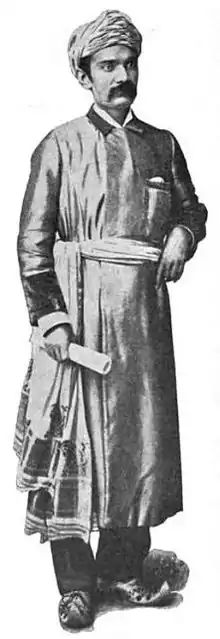 Virchand Gandhi | |
| Born | 25 August 1864 Mahuva, Gujarat |
| Died | 7 August 1901 (aged 36) Mahuwar, near Mumbai, India |
| Education | B.A.(Law) |
| Alma mater | University of Bombay |
| Occupation | Lawyer, scholar on Jainism |
| Known for | Representing Jainism at the first World Parliament of Religions, Chicago 1893 |
| Children | ? |
| Parent(s) | Raghav Tejpal Gandhi |
| Signature | |
Background and early accomplishments
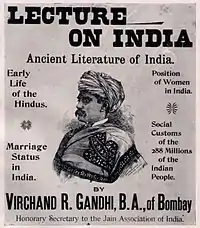
Gandhi was born on 25 August 1864[3] in Mahuva near Bhavnagar (now in Gujarat, India),[4] to Mahuva Nagar Sheth[5] and Raghavji Tejpalji Gandhi. His father, Raghavji, was a businessman.[2][6] After completing primary and secondary school in Mahuva, Gandhi was sent to Bhavnagar for further studies.[7] In 1879, Gandhi married Jiviben.[8][5] At the age of sixteen, upon placing first on the Bhavanagar matriculation examination, he was awarded the ‘Shri Jaswant Singhji’ scholarship.[7] Gandhi continued his education at Elphinstone College, of the University of Bombay.[2][4][9] He graduated with honors in 1884, having earned a bachelor's degree in law.[2][3][4][9] Gandhi was a polyglot who spoke fourteen languages, including Gujarati, Hindi, Bengali, English, Prakrit, Sanskrit, and French.[3] Gandhi was a friend of Mahatma Gandhi, and joined Mahatma in his "experiments in dietetics" (vegetarianism). Virchand helped Mahatma in the latter's struggle to establish a legal practice.[10]
In 1885, at the age of 21, he became the first honorary secretary of the Jain Association of India.[9] During his term, he fought against a tax being levied by the ruler of Princely State of Palitana on pilgrims visiting Mount Shatrunjaya, Palitana.[4] During the course of this fight Gandhi met Lord Reay, the British colonial governor of Bombay, and Colonel John Watson of the Kathiawar Agency. With the help of these two individuals, he ultimately negotiated an annual fixed payment of Rs. 15000, rather than an individual tax on each pilgrim.[6] Gandhi also fought to close a pig slaughterhouse that had been started in 1891 close to Mount Shikharji, a holy place of Jain pilgrimage. Gandhi spent six months in Calcutta learning Bengali and preparing his case against the slaughterhouse. He was eventually successful in getting the slaughterhouse closed.[4]
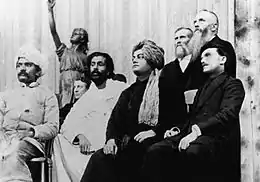
Trip to the World Parliament of Religions
Gandhi represented Jainism at the first World Parliament of Religions, held in Chicago in 1893.[4] Jain monk Acharya Vijayanandsuri, also known as Acharya Atmaram, had initially been invited to represent Jainism at the Parliament, but as Jain monks do not travel overseas, he could not attend. Atmaram recommended Gandhi to go in his stead and serve as the emissary for the religion. Atmaram and his disciple Vallabhsuri trained Gandhi for six months.[4][6]

Gandhi received a positive response at the Parliament[4][6] and was asked to deliver more lectures. He ultimately stayed two years in the US and one year in the UK[4] He went outside India to promote Jain values on two other occasions,[4] and is known for giving about 535 lectures on Jainism and having attracted followers from outside India to Jainism.[4] He was awarded various medals for his lectures.[4]
He was a contemporary to Swami Vivekanand, who deeply admired him. He faced criticism over his sea voyage, which was at the time considered unholy. Vivekanand, impressed with Gandhi's adherence to vegetarianism in the face of the cold Chicago climate, came to his defence: in an 1894 letter to Haridas Viharidas Desai, Diwan of Junagadh, he wrote "Now here is Virchand Gandhi, the Jain whom you knew well in Bombay. This man never takes anything but mere vegetables even in this terribly cold climate and tooth and nail tries to defend his countrymen and the religion. The people of this country like him very well. But what are they doing who sent him over? They are trying to outcast him."
Herbert Warren, who studied Jainism under Gandhi and adopted the Jain religion, published a book on Gandhi's lectures titled Herbert Warren's Jainism.
The American newspaper, the Buffalo Courier, wrote regarding Gandhi, "of all Eastern scholars, it was this youth whose lectures on Jain Faith and Conduct was listened to with the greatest interest and attention". Later, in Kasadova, he delivered a lecture on 'Some Mistakes Corrected' on 8 August 1894, which prompted the citizens of the city to award him a gold medal.[11]
Gandhi had studied Buddhism, Vedanta Philosophy, Christianity, and western philosophy. He praised Mogul Emperor Akbar for his equal treatment of all religions.
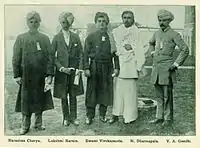
Gandhi propagated the relevance of Jain tenets and Mahavira's message of nonviolence. He delivered about 535 speeches on Jainism, other religions, and social and cultural lives in India, all of which received wide publication. He was invited two more times, first in 1897, and then in 1899 to the West.[2]
Later life and death
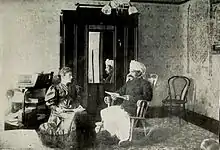
| Part of a series on |
| Jainism |
|---|
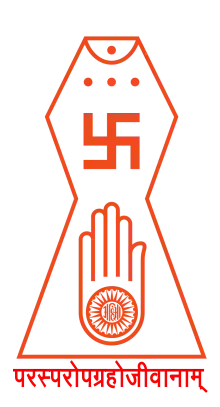 |
|
|
Gandhi founded Gandhi Philosophical Society and the Society for the Education of Women in India (SEWI). He participated in Pune session of Indian National Congress in 1895 as a representative of Bombay state,[2][4] and lectured on Indian politics and industry in Large Hall of William Science building on 19 December 1898. He also participated at the International Conference of Commerce in 1899 and represented Asia.[4] He settled tax disputes of Palitana and Shikharji piggery case.[2]
Gandhi died at the age of thirty-seven[4] of haemorrhaging of the lungs on 7 August 1901 at Mahuwar, near Mumbai, India.
Works
- The Unknown Life of Jesus Christ: translation from French to English. It was a manuscript found in Tibet.[12]
- The Life of Saint Iss[13]
- Religion and philosophy of the Jainas[14]
Collection
- Speeches and Writings of Virchand R. Gandhi, collected and edited by Bhagu F. Karbhari
Recognition
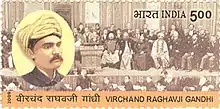
- Gandhi was accorded both a welcome and honour by many literary and spiritual institutions, churches and societies. He was presented with medals.[2]
- A museum was constructed and dedicated to Gandhi in 1964.[2]
- In the 1990s, statues of Gandhi were erected in Chicago and Mahuva.[2]
- He was remembered on 1993 Parliament of World religions.[4]
- A drama based on his life, Gandhi Before Gandhi, was performed 200 times throughout the world.[2]
- On 8 November 2009, the Indian Postal Department honoured him by issuing a postal stamp with his image.[2][15][16]
See also
References
- Howard, Mrs. Charles (April 1902). The Open Court, Vol. 16, Nr. 4 "The Death of Mr. Virchand R. Gandhi". Chicago: The Open Court Publishing Company.
- Tribune, India. "Virchand Gandhi – a Gandhi before Gandhi An unsung Gandhi who set course for his namesake". India Tribune. Retrieved 17 August 2012.
- "Virchand Raghavji Gandhi: A Jain Hero". JAINA: Federation of Jain Associations in North America. JAINA. Retrieved 21 May 2016.
- Shah, Natubhai (2004), Jainism: The World of Conquerors, Motilal Banarsidass, pp. 55–56, ISBN 978-81-208-1938-2
- "Glimpse of Virchand Gandhi Stamp Release and 'A tribute to 19th century Indian Legend' Book by JAINA.VRG". HereNow4U. HereNow4U. Retrieved 30 May 2016.
- Virachand Gandhi
- Shah, Raksha. "The Valiant Jain Patriot-Virchand Raghavji Gandhi". Jainsamaj. Ahimsa Foundation. Retrieved 21 May 2016.
- "Barrister Virchand Raghavji Gandhi (VRG) Timeline biography". The South Asian Times. The South Asian Times, LLC. Retrieved 22 May 2016.
- Desai (ed.), Mohanlal Dalichand (1936). "Virchand R. Gandhi in America", in Jainacharya Shri Atmanand Janma Shatabdi Smarak Grantha (Jainacharya Shri Atmanand Centenary Commemoration Volume). Bombay. pp. 4–9.CS1 maint: extra text: authors list (link)
- Gandhi, Mahatma (1927). "28 "The First Case"". The Story of My Experiments with Truth. India: Jitendra T. Desai. ISBN 0-8070-5909-9. Retrieved 21 May 2016.
- "JAINA, VRG Scholarship Brochure" (PDF). JAINA, VRG Committee.
- Gandhi, Virchand R. (2003). The Unknown Life of Jesus Christ. Kessinger Publishing. p. 138. ISBN 0766138984.
- Gandhi, Virchand R. (2010). The Life of Saint Iss. Kessinger Publishing. p. 138. ISBN 1161579117.
- Gandhi, Virchand (1993). Nagīna Jī Śāha (ed.). Religion and philosophy of the Jainas. Jain International.
- Jain, Manik (2018). Phila India Guide Book. Philatelia. p. 219.
- http://postagestamps.gov.in/Stamps_List.aspx
Further reading
- Gandhi, Virchand R. (1970), Dr. K. K. Dixit (ed.), The Systems of Indian Philosophy:Speeches and Writings of Virchand R. Gandhi, Mumbai: Shri Mahavir Jain Vidyalaya Bombay
- Shubhachandradevsuri (1989), Pannalal R. Shah (ed.), Savirya-Dhyan (in Gujarati), Gandhi, Virchand R. (trans.), Anandnandan Lalan (commentary), Bombay: The Jain Association of India
- Dr. Bipin Doshi & Preeti Shah (2009), Gandhi Before Gandhi
- Selected speeches of V. R. Gandhi, 1964 English
- Selected speeches taken from books 1, 2, and 3. Publisher – Vallabh Smarak Nidhi, Bombay
- A tribute to 19th Century Indian Legend: Shri Virchandji Raghavji Gandhi, 2009, English
- Edited By Gunvant Barvalia, Mahesh Gandhi, Pankaz Chandmal Hingarh (Published by Pravin C Shah Chair & Prakash Mody – Federation of Jain Association of North America, VRG Committee)
External links
| Wikimedia Commons has media related to Virchand Gandhi. |
| Wikiquote has quotations related to: Virchand Gandhi |